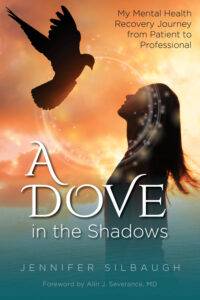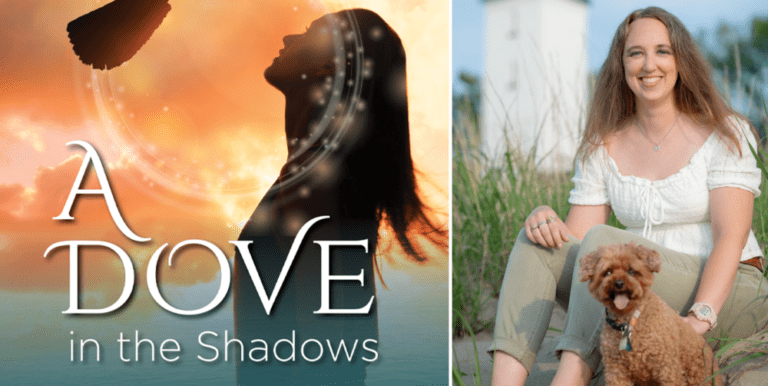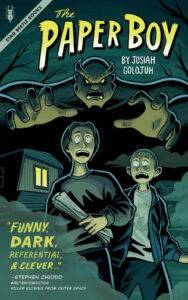“Through resiliency and the power of her will, she was able to heal and then, as a certified peer specialist, successfully dedicate herself to supporting other people with mental illness. Her story will certainly provide hope to others.” – Boris Birmaher, MDProfessor of Psychiatry
From the Publisher: “Have you ever felt completely broken?
Like you’re barely surviving each day, just existing?
Relying on something to keep you going … but then it’s gone.
And that’s when you chose to rely on no one but yourself …
Your dreams …
Your drive …
Your hope.
You discover it’s all in your control and learn how you turn your pain into your power.
Author Jennifer Silbaugh was caught in a system she depended on to keep her alive, but reached the end of the road, looked around, and saw nothing but darkness.
When the mental health community ran out of options to help her, she chose to turn within. She decided to live fully, with hope, seeking joy, knowing that she needed to be in charge to create what she wanted in life.
And that’s when she transformed her darkness into the most beautiful light.
Though she was once behind locked doors, looking for ways to stop the pain in her head, she was able to heal and find peace.
She discovered that the place where she’d suffered the greatest was the place where she was meant to work, to help others in the shadows. As a certified peer specialist, she could tell others she believes in them too, that they can recover like she did.
Join Jennifer on her journey from decades as a patient in the mental health system to becoming a person who helps others as they travel similar paths. She strives every day to maintain her recovery and make her wellness her number one priority.
If you’ve struggled with mental health-through depression, anxiety, despair, desperation-then know there really is hope for change.
And sometimes it lies within.
Jennifer’s story inspires the reader to be their own advocate, friend, and hero on the journey from broken to belonging.”
More info About the Author: Jennifer Silbaugh is a first-time author and a mental health advocate. She is a healthy, strong woman and a daughter, sister, wife, dog-mom, homeowner, artist, handbell ringer, consumer, advocate, and professional in the mental health field. She is dedicated to offering help and hope to those suffering from mental health challenges and finds joy in her family, friends, art, and God.
Jennifer’s journey from patient to professional began in 1993 as a patient seeking help with her own mental health struggles. After many years and some changes in the system, she was (and is) considered a consumer. A tumultuous journey involving a great deal of pain, lots of self-initiated hard work, and some key medical professionals started Jennifer’s advocacy path. Beginning in 2010, she was an advocate for UPMC’s Youth and Family Training Institute (YFTI) and worked on the Peer Support & Advocacy Network’s (PSAN) Warmline from 2011–2013.
A commitment to her own healing allowed Jennifer to become a certified peer specialist from 2013–2020. Jennifer was the first certified peer specialist to receive the UPMC Award for Commitment in Excellence and Service (ACES) in 2015.
Jennifer spends her summers camping and picking out beach glass on the shores of Lake Erie. She has a passion for recycling and finding beauty in what others see as trash. She loves finding treasures at garage sales and her local Goodwill outlet.
Jennifer believes sharing her story is empowering and hopes it can help others in their healing journey.
She lives in Rostraver Township, Pa., with her husband Scott and her poodle, Petey.
If you want to donate or learn more about programs that benefit consumers (like Jennifer) at UPMC Western Psychiatric Hospital and UPMC Western Behavioral Health, please inquire via their website or email: makingmindsmatter [at]upmc.edu.
 Tell us about how you pieced this story together, since you suffered memory loss from your treatments.
Tell us about how you pieced this story together, since you suffered memory loss from your treatments.
I have long-term memory loss, which means during the 15+ years I had treatments I cannot remember much of what occurred during them. Since the treatments ended, I have full capacity like anyone else to retain and make new memories. Since I was 11, I wrote in journals. It became just as important as taking a daily medication. It was second nature to me to write down the good times and bad in daily life. My negative thinking told me, “There is no way you have enough material to write a book with how your memory is,” but I was able to challenge my thinking when I decided to commit to writing my story.
I was able to pull a lot of material from a few past journals I kept, enough to recall what I needed to write about the things in the past. I stayed in touch with several people from my past and talked about encounters, which are in my book, to help trigger my memory. I tried to focus more on the recovery part of my story, which comes after my treatments have ended and my memory is restored. I do not “suffer from memory loss” but I chose to “cope with it,” which nonetheless is hard but manageable.
What was your greatest challenge in telling this story?
The biggest challenge I faced was myself and the quantity of disorganized journal entries I had. I knew I wanted to write a book when I went to a writing course in college over 20 years ago. It was always just “A Dream,” just something constantly lingering in my everyday thoughts that wouldn’t go away. I tried to write my book about 8 years ago and realized the timing of life and the stress it was bringing was not healthy for me.
I gave myself an ultimatum this past winter: I was either going to commit to writing it from start to finish or let it go. I’m not one for giving up, and I had to focus on the hope I needed others to hear to motivate me to keep going. I figured I had something good to say so it’s better than not saying anything at all. I have never met and don’t plan on meeting anyone as hard on myself as ME. The constant anxiety, depression, and doubt throughout the process got harder and easier as the book progressed. If I don’t have myself on my side, then I don’t have anything. I am my best friend and encouragement. I kept my mental health struggles in check and decided I wasn’t going to give up again on my book.
How did you feel about sharing some of the tougher parts near the beginning, like when you left the crisis center and waited outside, hoping to die?
It wasn’t as hard as I thought. I had lived it, and that was the hard part. As a CPS (certified peer specialist) I would share little bits of my story with people I met in the ER, so it wasn’t my first time giving a glimpse of my life to strangers. After I finished writing the book, I realized that people who knew me throughout my life might read this book and be shocked. The “Old Jen” did her best to not bother people and stay at a distance. I had to remember why I wrote this book and got positive feedback when I talked this over with some people.
It was hard to read my journal entries from the past. I always knew my emotions, thoughts and feelings were important, but I didn’t know they could be transformed into something for good. I threw most of my journals away one garbage night because I didn’t want to have the past with me anymore. I thought I had moved on from it and didn’t want to even know the pain was still near in a box. I hadn’t fully understood that my past was also my key to the future. I chose to write the more emotional chapters at different times and spaced them in between writing some happier material. I am comfortable talking about my pain but do try to limit it so I don’t feel stuck in the trauma.
There has been a long-standing stigma around mental health, what people are like who need help, and seeking help altogether. What do you hope your book will do in that conversation?
I hope people will not have to hide what is really going on. I want people to be accepted for who they are and what is going on with them. I have met people who clearly could use some psychiatric treatment but have never been diagnosed and then there are people like me who are diagnosed and face stigma just because of a few words in their medical chart.
When it comes down to it all, people are people and should be treated that way. I hope people can look past a diagnosis to see who the person really is and listen to what they think will help them. There is no certain way a person looks like to have someone judge them as having “A mental health disorder” There is no bloodwork, no medical test that can provide a direct path to wellness. You are your best hope for finding what helps and works for you. I hope there are more varied treatment facilities and options for people who don’t fit in a “one size fits all” recovery plan. We all recover differently. At different times in our lives, at different paces, or maybe not at all. I hope other counties, other cities, and other states can use funding to provide crisis services to people out in the community rather than just in a hospital.
Because you’ve been on this mental health journey, how does that change your perspective of other people you meet?
I have learned to not judge anyone and practice what I preach. My faith and core values of being a CPS has led me to be more open and accepting of everyone. No matter who you are, where you are, and what you are, I support you. It doesn’t bother me and I don’t act a certain way if you are different than me. We are all different, and that’s what makes us special. I love learning about different cultures and hearing others unique recovery stories. We are all in this world together, so why not come together to make it a better place?
What do you hope readers take away from this book?
No matter your pain, there is HOPE. Past, present, or future pain can have a purpose and doesn’t have to control you or your life. Don’t surrender to it, embrace it. Always know it can end. Just as the world changes every day, so do you. There is always help and hope if you allow it into your life. I do not believe in “hopeless” anymore. No one or no situation is hopeless. There is a way to be happy and have a different life. You have to choose to change and commit to the uncomfortableness it might bring. Please do not give up. You are human, and humans aren’t meant to be alone. There is help out there and right inside of you, if you look.
And who do you most want to help with The Dove in the Shadows?
Those who are stuck, need hope, and want to live. I want everyone to know it is okay to be lost, it is okay to be hurting, and it is okay to want to give up. You don’t have to fit into a box that is supposed to help everyone. Fight for yourself and fight for change. You are allowed to be your own normal. Detach from your sufferings and know that you have an identity besides your diagnosis. Not everything you are going through has to be attached to your diagnosis. You are a human being before your diagnosis. You are just as beautiful even if you are broken. If no one can tell you they love you, want you, or need you, please learn to tell yourself. You alone can be stronger than anyone you are relying on. I hope my story opens more opportunities for peer support in other treatment settings and other mental health and medical fields.

























